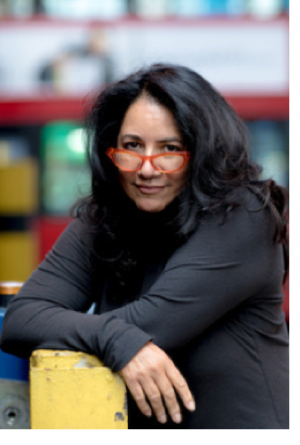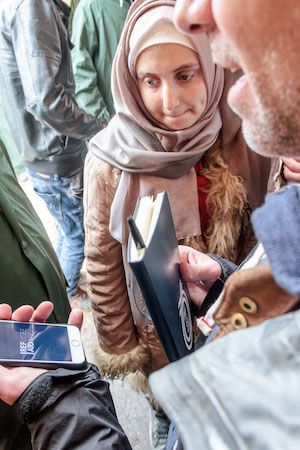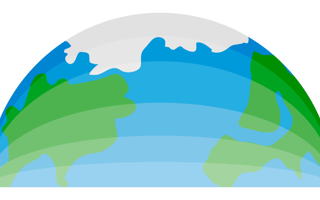Technology that provides humanitarian assistance for populations in need can be both helpful and harmful. It can steer people toward food, shelter and medical aid. It can also use them as vulnerable pawns for data mining and drone testing, among other destructive things. But many tech companies focus on the former and support humanitarian initiatives.
Just in the last couple of weeks, ONE (operated by the Yemen-based National Wallet Company) and Canadian mobile payment firm Telepin combined forces to provide “cashless e-wallet services” for crisis-torn Yemenis. Around 1,300 miles away, in Israel, a water tech company called Watergen launched a pilot program aimed at bringing more clean water to the Gaza neighborhood of Abasan al-Kabira. Other examples abound.
What Are Humanitarian Tech Companies?
Shelley Taylor’s organization RefAid is among them. A veteran tech entrepreneur, Taylor wants to make a profit. But she also wants to help people. And so she put her considerable know-how to work to develop an app designed for migrants and refugees who want to find various social services in countries where they’re located or to which they’re headed. Privately funded by Taylor and operating on servers supported by her company, Trellyz, RefAid is now in its fourth year, and grows largely by word of mouth.
Taylor (pictured below) recently spoke with Built In about her still-evolving invention and a similar app that just launched in the United States.
What led you to develop your RefAid app?

When I saw that horrible image on the beach [of a drowned Syrian boy], I really wanted to help. So I thought, “I’ll make an app that lets refugees find the help they need where they are.” I went to the UNHCR and the British Red Cross and asked if [that kind of app] would be useful for refugees when they landed in Greece or Italy. And they said it would. I literally made the app over a weekend. The problem I had to solve was not getting [that information onto phones], it was helping these organizations create a database of their services. And it grew to 23 countries really quickly, with thousands and thousands of nonprofits using it.
It seems like this was an entirely altruistic endeavor on your part.
Totally. I wish I could say that I had some motive — that this was going to be great guerrilla marketing and lead to a commercial product. And it actually has led to a commercial product, but I didn’t have any thought of that.
Are altruism and capitalism necessarily mutually exclusive?
Not at all. I think a lot of investors think [they are], for sure. It’s not easy for us to find investors because people think, Oh, this is the government technology sector. They take forever to make a decision. But they make decisions quickly. They have procurement processes that can take awhile, but they keep their business with you for 10 years. It’s a much better return than in the private sector, where [customers] are turning over all the time.
There are those who say a lot of tech companies develop and support humanitarian aid initiatives because they have ulterior motives. Like data mining, for instance. Do you think that’s overblown, or is it actually the case?
I do think it’s the case. Some of the time. This humanitarian space is so fragmented. The software solutions that are available are so poor, and they’re not fit for the purpose because the nonprofit and government space is so different from the private sector. There are a lot of people who launched apps into the refugee context who had really good motives, but they didn’t really have the technology chops to pull it off. So there’s a cemetery of dead ops out there that no one could maintain.

RefAid has been up and running for four years. What kind of results have you seen or heard about from various organizations that use it?
In terms of measuring [its impact], we don’t do a lot of that. At any given time, there could be tens of thousands of refugees in different countries using it. There are lots of people in Spain, for example, who have the app on their phone, but we don’t really have a lot of services up throughout Spain yet. That just shows us that people have migrated, or they heard about RefAid and downloaded it on their phone. And I think a lot of volunteers and nonprofits use the app. We have a web portal for service providers as well. In countries like Belgium or Greece or Italy, there’s often another app that does some similar things. But migrants, by their nature, are crossing borders, and we’re the only one they can use to find help as they go across different territorial lines.
“There are a lot of people who launched apps into the refugee context who had really good motives, but they didn’t really have the technology chops to pull it off.”
Are you open to RefAid being subsidized by the Gates Foundation or another philanthropic organization?
The Gates Foundation only supports nonprofits. I believe that the private sector has a really important role. We get asked to get involved in a lot of projects globally because we’re for-profit and we’re way more efficient. We don’t have the bureaucracy; we don’t have to go out and fundraise. So I think that the Gates Foundation and others like it should be looking more closely at how the private sector can also be part of the solution. It’s corporate social responsibility.
Isn’t there potential for abuse when you have all this data about various populations?
You’re right, but we don’t require real email addresses. We have a registration [process], but we don’t authenticate it. And the reason for that is if a government came to us and said, “We need all your data,” we don’t want to know who these people are. So we’re collecting aggregated data, but we’re not collecting personal data unless people want to use their real names. The aggregated data helps us make sure that there are services available in the place where people need it. In some European countries, horrible things are happening to migrants. And there are a lot of issues around personal data in general. When we’re rolling out the app with different counties, we say to them, “There's some stuff we’re not going to let you have access to.” So there are a lot of checks and balances built in.
Is there still a lot of ignorance around technology in the humanitarian sector?
Yes, a lot. I went to a conference for the 60 or 70 largest international non-governmental organizations in the world. [Some of] the CTOs and CEOs were there, and one of the speakers said that sector was 30 years behind the private sector in management information systems. If you know what’s happened in tech in 30 years, that’s saying something. My commercial business grew out of RefAid when some of our nonprofits suggested we do something for all aspects of nonprofit and government, not just refugees. So we launched a new app called LifeSpots this past summer. It’s every kind of public and social service in one place, where governments and nonprofits can work alongside each other and have visibility across both sectors. And I think it’s going to be world-changing.




